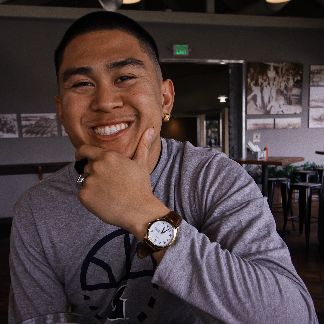Rizal Aliga was playing a game of pickup basketball at UC Santa Cruz when Loukas Stelyn-Lawson, then hip-hop director at the campus’s 20,000-watt radio station, KZSC 88.1 FM, walked up.
“You’re that guy from Vallejo,” Aliga remembered Stelyn-Lawson saying.
Vallejo is a North Bay city of 120,000 that is racially diverse but economically challenged, and is viewed by many as the unofficial hip-hop capital of California. It had produced artists from the late Mac Dre to SOB x RBE, whose break-out hit from the Black Panther soundtrack went international. Grammy Award–winning R&B artist H.E.R. is also from Vallejo.
Aliga, who’d indicated an interest in joining KZSC during a campus summer academy for incoming students, told Stelyn-Lawson he was, indeed, “that guy.” Within months, Aliga was part of the iconic KZSC radio crew being mentored by Stelyn-Lawson and Keith Rozendal, the station’s advisor and chief operating officer.
When Stelyn-Lawson graduated, Aliga took up as host of Stelyn-Lawson’s “Got Rapps” show and also began livestreaming and doing play-by-play announcing for campus sports like basketball and volleyball and also deejaying. In addition, he hosted the station’s first student-run Island Reggae show and produced or contributed to 214 blogs and artist interviews.
Now, Aliga (Cowell ’19, legal studies with an education minor) has taken the same model to Jesse Bethel High School in Vallejo where he graduated in 2016. There, he’s established a student-run broadcasting club modeled on KZSC that—until it was sidelined by the Covid-19 pandemic—had begun livestreaming school sports games and highlighting the campus and students’ accomplishments through interviews and reporting on Instagram.
“If it wasn’t for him and the radio station, I don’t know where I’d be right now,” said 17-year-old Jesse Bethel senior Giovanni Miles, who hopes to go to film school after graduation. “Before that, I was just going to school and going home. I wasn’t interested in things. Once I got involved in the radio station I decided to do more with my life after school.”
Ask Aliga about the high school broadcast club, KJBJ, and he talks with the kind of enthusiasm reserved for a sportscaster at a home game. He started the club right after he was hired as a long-term substitute teacher following his graduation from UC Santa Cruz. There are about 50 students in the lunchtime and after-school club—20 of them hardcore, he said—who are not only learning technical and broadcasting skills but also things like FCC rules, journalistic ethics, and ways to conduct a good interview.
“For instance, you have to have a higher vocabulary,” said Jesse Bethel senior Safa Haywood, 17. “You can’t use the same word constantly (in a broadcast). It gave me a reason to start reading more and looking words up in the dictionary (to do play-by-play). I also had to learn the rules of each sport. I did a lot of that. You have to learn a lot of things.”
For Aliga, the broadcasting club is a way to not only connect students to their school and break down the wall of distrust that he said sometimes exists between students and their teachers or administrators, but also inspire them to build careers and hone the skills needed to communicate with others. He hopes the club will not only help students become a more active part of their school but also that it becomes self-sustaining, even after he is gone.
“I think he (Aliga) is a really positive role model and one of our biggest cheerleaders for the school,” said Ann Talamantes-Ristow, activities director for Jesse Bethel High. “He decided to come back and do something to really make an impact on our student population and he has definitely done that. Kids like him. They really do.”
Aliga, whose mother is a Vallejo City Council member and his dad a 33-year military veteran, said he’d eventually like to come back to UC Santa Cruz to pursue a master's degree but, for now, he’s happy to be able to spread the KZSC vibe of non-commercial broadcasting and inclusivity beyond the boundaries of Santa Cruz.



